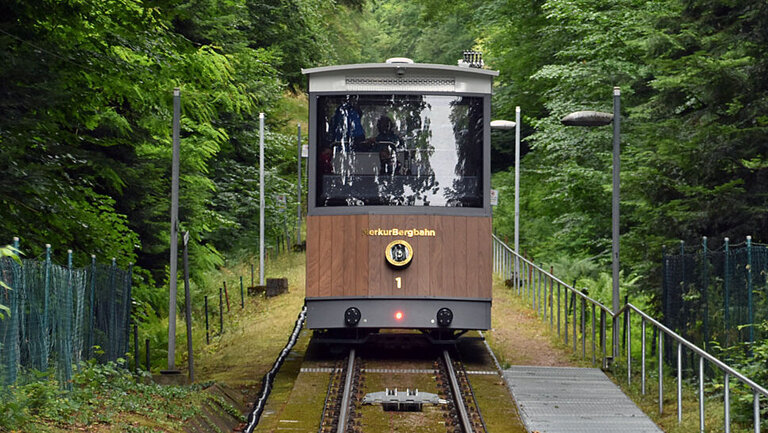Baden-Baden, April 21, 2021. The Baden-Baden Department of Public Works has invested almost €8 million on a comprehensive general upgrade of the historic Merkur cable railway, which now climbs 370 meters over a distance of 1.2 kilometers in less than five minutes. The upgrade was essential, as otherwise the license for the funicular would have been lapsed back in 2017. The Department of Public Works was supported throughout the four-year upgrade process by the Stuttgart-based planning and consulting company Drees & Sommer.
Since its opening in 1913, the cable car has been the fastest and most environmentally friendly way for day-trippers, hikers and nature-lovers to reach the top of Baden-Baden’s Merkur mountain. In 2019 – before the coronavirus pandemic – around 280,000 passengers took the trip to the 668-meter-high summit to enjoy the impressive views of the northern Black Forest and the Rhine valley. New features include the mechanical and electrical systems, the steel cables – which, with a diameter of 30 millimeters, are now four millimeters thicker than before – and the monitoring and ticketing system. The railway line was also fitted with 130 new pairs of rollers to guide the new steel cable. “The disabled and parents with buggies also benefit from the upgrade – new ramps and elevators mean that the peak and valley stations are now wheelchair-accessible,” explains Helmut Oehler, manager of the Baden-Baden Department of Public Works. The restaurant and its pavilion at the peak station were also modernized during the closure, so guests will be still be able to enjoy its culinary delights during their stay on the mountain top.
The station buildings were also refurbished as part of the required upgrade. With the agreement of the Baden-Württemberg State Heritage Authority, the color scheme is a warm beige, the same as the one used when the peak and valley stations opened back in 1913. This replaces the dark green most recently used for the station facades. By popular demand, this retro look was also extended to the two new cable cars. Locals were invited to vote online for their favorite design. The competition was won by a design featuring brown ship planks, which are supposed to be particularly weather-resistant and will thus ensure a long service life of the cars. Manufactured in Switzerland, the new cars – which look like those from the time of Kaiser Wilhelm II – are about one meter longer than their predecessors and have a new ventilation system designed to minimize heat build-up in the summer.
Faster and quieter
In automatic mode, a car will set off from the valley station every 8 to 15 minutes in future, depending on the passenger numbers. Although coronavirus restrictions mean that a maximum of 20 people with masks can travel at once – as opposed to the normal capacity of up to 38 passengers – the Baden-Baden Department of Public Works hopes to increase the railway’s annual capacity to 300,000 passengers soon. This is made possible by substantial increase in the speed of the cable car from 21.6 to 28.8 kilometers per hour – achieved at the same time as a reduction in the noise level. The cable car climbs an incline of between 23 and 54 percent, making it the longest and steepest funicular railway in Germany.
“The general upgrade, which was closely coordinated with the State Heritage Authority throughout, and, at just under €8 million, remained within budget, and was completed within the four-year schedule,” says Drees & Sommer project leader Sebastian Beck. The Stuttgart planning and consulting company supported the operator with project control services throughout the upgrade.
